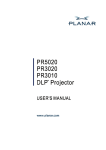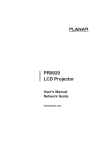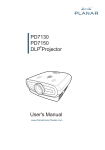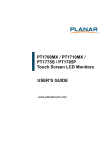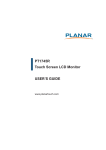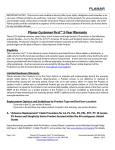Download Planar PR6020 Product Manual
Transcript
PR6020 DLP® Projector USER'S MANUAL www.planar.com Planar Systems, Inc Corporate Headquarters 1195 NW Compton Drive Beaverton, OR 97006-1992 Planar Customer Support Telephone: US: 1-866-PLANAR1 (866) 752-6271 Outside US: (503) 748-5799 E-mail: [email protected] Online Technical Library: http://www.planar.com/support Hours: M-F, 8am - 8pm ET, 12pm - 12am GMT The information contained in this document is subject to change without notice. This document contains proprietary information that is protected by copyright. All rights are reserved. No part of this document may be reproduced, translated to another language or stored in a retrieval, system, or transmitted by any means, electronic, mechanical, photocopying, recording, or otherwise, without prior written permission. Windows is a registered trademark of Microsoft Inc. Other brand or product names are trademarks of their respective holders. Important Recycle Instruction Lamp(s) inside this product contain mercury. This product may contain other electronic waste that can be hazardous if not disposed of properly. Recycle or dispose in accordance with local, state, or federal Laws. For more information, contact the Electronic Industries Alliance at http://WWW.EIAE.ORG. For lamp specific disposal information check at http://WWW.LAMPRECYCLE.ORG. Register Your Planar Products Today Thank you for choosing Planar. To assure you receive all the benefits of your Planar product and services, register your Planar product today. Visit our website to register your product at http://www.planar.com/support/product_registration. html. Cables, Replacement Lamps and Accessories To find cables, replacement lamps and accessories for your Planar projector, LCD monitor, touch-screen or other Planar product visit our online store at www. PlanarOnline.com or find other stores who carry Planar products at http://www. planar.com/howtobuy. Table of Contents Table of Contents.......................................................................................... 1 Usage Notice................................................................................................. 2 Precautions...........................................................................................................2 Introduction................................................................................................... 4 Product Features...................................................................................................4 Package Overview................................................................................................5 Product Overview..................................................................................................6 Main Unit.........................................................................................................................6 Control Panel..................................................................................................................7 Connection Ports............................................................................................................7 Remote Control with Laser Pointer.................................................................................8 Setting Up..................................................................................................... 9 Connecting the Projector.......................................................................................9 Powering On/Off the Projector............................................................................10 Powering On the Projector............................................................................................10 Powering Off the projector............................................................................................ 11 Warning Indicator.......................................................................................................... 11 Adjusting the Projected Image............................................................................12 Adjusting the Projector Image Height...........................................................................12 Adjusting the Projector Zoom / Focus...........................................................................13 Adjusting Projected Image Size....................................................................................13 User Controls.............................................................................................. 14 Control Panel & Remote Control.........................................................................14 On-Screen Display Menus..................................................................................16 How to Operate . ..........................................................................................................16 Menu Tree...........................................................................................................17 Language......................................................................................................................18 Image-I . .......................................................................................................................19 Image-II (Computer Mode)............................................................................................21 Image-II (Video Mode)..................................................................................................23 Audio.............................................................................................................................25 Management.................................................................................................................26 Lamp Setting.................................................................................................................27 Appendices................................................................................................. 28 Troubleshooting...................................................................................................28 Replacing the Lamp............................................................................................32 Compatibility Modes............................................................................................33 English Usage Notice Precautions Follow all warnings, precautions and maintenance as recommended in this user’s guide to maximize the life of your unit. Warning- Do not look into the projector’s lens when the lamp is on. The bright light may hurt your eyes. Warning- To reduce the risk of fire or electric shock, do not expose this product to rain or moisture. Warning- Please do not open or disassemble the product as this may cause electric shock. Warning- When changing the lamp, please allow unit to cool down, and follow all changing instructions. Warning- This product will detect the life of the lamp itself. Please be sure to change the lamp when it shows warning messages. Warning- Reset the “Lamp Reset” function from the On Screen Display “Lamp Setting” menu after replacing the lamp module (refer to page 27). Warning- When switching the projector off, please ensure the projector completes its cooling cycle before disconnecting power. Warning- Turn on the projector first and then the signal sources. Warning- Do not use lens cap when projector is in operation. Warning- When the lamp reaches the end of its life, it will burn out and may make a loud popping sound. If this happens, the projector will not turn back on until the lamp module has been replaced. To replace the lamp, follow the procedures listed under “Replacing the Lamp”. (see page 32) English Usage Notice Do: Turn off the product before cleaning. Use a soft cloth moistened with mild detergent to clean the display housing. Disconnect the power plug from AC outlet if the product is not being used for a long period of time. Don’t: Block the slots and openings on the unit provided for ventilation. Use abrasive cleaners, waxes or solvents to clean the unit. Use under the following conditions: - In extremely hot, cold or humid environments. - In areas susceptible to excessive dust and dirt. - Near any appliance that generates a strong magnetic field. - In direct sunlight. English Introduction Product Features Congratulations and Thank You for choosing the PR6020 projector. This product is a XGA single chip DLP® projector. Outstanding features include: True XGA, 1024 x 768 addressable pixels Texas Instruments Single chip DLP® Technology NTSC/NTSC4.43/PAL/PAL-M/PAL-N/SECAM and HDTV compatible (480i/p, 576i/p, 720p, 1080i) Multi-Auto functions: Auto detection, Automatic saving of user adjustments IR remote control with laser pointer User friendly multilingual on screen menu Advanced digital keystone correction and high quality full screen image re-scaling User friendly control panel One built-in speaker UXGA, SXGA+, SXGA compression and SVGA, VGA resizing Mac compatible English Introduction Package Overview This projector comes with all the items shown below. Check to make sure your unit is complete. Contact your dealer immediately if anything is missing. Projector with lens cap Power Cord 1.8m VGA Cable 1.8m Composite Video Cable 1.8m Wireless Remote Controller USB Cable 1.8m 2 x AA Batteries Carry Bag Documents: User’s Manual User’s Guide English Introduction Product Overview Main Unit 2 1 3 4 5 6 7 8 2 1 9 1. 2. 3. 4. 5. 6. 7. 8. 9. English Control Panel Zoom Lever Power Socket Speaker Elevator Button Zoom Lens Focus Ring IR Receiver Connection Ports Introduction Control Panel 4 3 5 1. 2. 3. 4. 6 2 1 7 8 Enter Menu (On/Off) Power Four Directional Select Keys 5. 6. 7. 8. 9. 9 Source Select Resync Power LED Lamp Indicator LED Temp Indicator LED Connection Ports 6 5 4 3 2 1 1. VGA-In Connector (PC Analog signal/SCART RGB/ HDTV/Component Video Input) 2. Composite Video Input Connector 3. S-Video Input Connector 4. Audio Input Connector 5. Service Connector/Remote page up & page down 6. KensingtonTM Lock Port English Introduction Remote Control with Laser Pointer 8 1 9 2 3 English 10 4 11 5 12 6 13 7 1. Enter 2. Four Directional Select Keys 3. Keystone +/4. Page Up 5. Page Down 6. Source Select 7. Freeze 8. Power 9. Menu 10. Laser 11. Mute 12. Resync 13. Hide Setting Up Connecting the Projector 1 2 3 1 8 S-Video Output 6 5 4 Video Output 7 DVD Player, Settop Box, HDTV receiver 1................................................................................................................ VGA Cable 2.............................................................Audio Input Cable (Optional Accessory) 3................................................................................................................. USB Cable 4.......................................................................................... Composite Video Cable 5.....................................................................S-Video Cable (Optional Accessory) 6......................................................... Audio Output Cable (Optional Accessory) 7.......................................SCART VGA/S-Video Adaptor (For European Only) 8..................................... D-15 to RCA Adapter for YPbPr (Optional Accessory) To ensure the projector works well with your computer, please set the display mode of your graphic card less than or equal to 1600 x 1200 resolution. Make sure the timing of the display mode is compatible with the projector. Refer to the “Compatibility Modes” section on page 33. English Setting Up Powering On/Off the Projector Powering On the Projector 1. Remove the lens cap. 2. Ensure that the power cord and signal cable are securely connected. The Power LED will flash green. 3. Turn on the lamp by pressing “Power” button on the control panel and the Power LED will turn green. 4. Turn on your source (computer, notebook, video player, etc.). The projector will detect your source automatically within “Management” menu; check that “Source Lock” has been set to “Off”. If you connect multiple sources at the same time, use the “Source” button on the control panel or on remote control to switch. 2 Power Turn on the projector first and then the signal sources. 1 English 10 Lens Cap Setting Up Powering off the projector 1. Press the “Power” button to turn off the projector lamp; you will see a message displayed on the projector’s screen. Press the “Power” button again to confirm, otherwise the message will disappear after 5 seconds. Please note that if the key is pressed instead, the projector will enter the “Hide” mode and no image will be displayed. To exit the “Hide” mode, press the “Power” button again. 2. The cooling fans continue to operate for about 20 seconds for cooling cycle and the Power LED will turn green. When the Power LED begins flashing, the projector has entered standby mode. If you wish to turn the projector back on, you must wait until the projector has completed the cooling cycle and has entered standby mode. Once in standby mode, simply press “Power” button to restart the projector. 3. Disconnect the power cord from the electrical outlet and the projector. 4. Do not turn on the projector immediately following a power off procedure. Warning Indicator When the “LAMP” indicator lights solid red, the projector will automatically shut itself down. Please contact your local reseller or service center. When the “TEMP” indicator lights solid red for about 60 seconds, it indicates the projector has been overheated. The projector will automatically shut itself down. (refer to page 31) Under normal conditions, the projector can be switched on again after it has cooled down. If the problem persists, you should contact your local dealer or our service center. When the “TEMP” indicator lights solid red, it indicates the fan failed. Please contact your local dealer or our service center. (refer to page 31) 11 English Setting Up Adjusting the Projected Image Adjusting the Projector Image Height The projector is equipped with elevator foot for adjusting the image height. To raise the image: 1. Press the elevator button . 2. Raise the image to the desired height angle , and then release the button to lock the elevator foot into position. 3. Use screw in feet to fine-tune the display angle. To lower the image: 1. Press the elevator button. 2. Lower the image, and then release the button to lock the elevator foot into position. 3. Use screw in feet to fine-tune the display angle. 1 2 Elevator Button English 12 Elevator Foot 3 Tilt Adjusting Foot Setting Up Adjusting the Projector Zoom / Focus You may turn the zoom lever to zoom in or out. To focus the image, rotate the focus ring until the image is clear. The projector will focus at distances from 4.9 to 39.4 feet (1.5 to 12.0 meters) with mechanical travel. Zoom Lever Focus Ring Di ag on Height Adjusting Projection Image Size al Width 38.1" (96.8cm) 34.7" (88.1cm) 127.1" (322.7cm) 76.2" (193.6cm) 115.6" (293.5cm) 69.3" (176.1cm) 177.9" (451.8cm) 161.8" (410.9cm) 228.7" (580.9cm) 208.0" (528.3cm) 304.9" (774.5cm) 277.3" (704.4cm) Hd 4.9'(1.5m) 9.8'(3.0m) 16.4'(5.0m) 23.0'(7.0m) 29.5'(9.0m) 39.4'(12.0m) Screen (Diagonal) Max. 38.1”(96.8cm) 76.2”(193.6cm) 127.1”(322.7cm) 177.9”(451.8cm) 228.7”(580.9cm) 304.9”(774.5cm) Min. 34.7”(88.1cm) 69.3”(176.1cm) 115.6”(293.5cm) 161.8”(410.9cm) 208.0”(528.3cm) 277.3”(704.4cm) Screen Max. 30.5”x 22.9” 77.4 x 58.1cm 61.0” x 45.7” 101.7” x 76.3” 142.3” x 106.7” 183.0” x 137.2” 243.9” x 182.9” 154.9 x 116.2cm 258.2 x 193.6cm 361.4 x 271.1cm 464.7 x 348.5cm 619.6 x 464.7cm (WxH) 27.8” x 20.8” 70.5 x 52.9cm 55.4” x 41.6” 92.5” x69.4” 129.4” x 97.1” 166.4” x 124.8” 221.8” x 166.4” 140.9 x 105.7cm 234.8 x 176.1cm 328.7 x 246.5cm 422.6 x 317.0cm 563.5 x 422.6cm Max. 3.4” (8.7cm) 6.9” (17.4cm) 11.4” (29.0cm) 16.0” (40.7cm) 20.6” (52.3cm) 27.4” (69.7cm) Min. 3.1” (7.9cm) 6.2” (15.9cm) 10.4” (26.4cm) 14.6” (37.0cm) 18.7” (47.6cm) 25.0” (63.4cm) 4.9’ (1.5m) 9.8’ (3.0m) 16.4’ (5.0m) 23.0’ (7.0m) 29.5’ (9.0m) 39.4’ (12.0m) Size Hd Distance (WxH) Min. This graph is for user’s reference only. 13 English User Controls Control Panel & Remote Control There are two ways for you to control the functions: Remote Control and Control Panel. Using the Control Panel 1 Power Source 14 Refer to the “Power On/Off the Projector” section on pages 10-11. 1 Press “Source” to select an input signal. Menu Turns the menu On or Off. Four Directional Select Keys Use Enter Confirm your item selection. Resync English 2 2 to navigate through the menus. Automatically synchronizes the projector to the input source. User Controls Using the Remote Control Power Refer to the “Power On/Off the Projector” section on pages 10-11. Resync Automatically synchronizes the projector to the input source. Laser Aim the remote at the viewing screen, press and hold this button to activate the laser pointer. Source Press “Source” to select an input signal. Keystone Adjusts image distortion caused by tilting the projector (±16 degrees). Mute Momentarily turns off the audio. Hide Momentarily turns off the picture. To exit the “Hide” feature, press “Hide” button again. Freeze Press “Freeze” to pause or unpause the screen image. Page Up Use this button to page up. Page Down Use this button to page down. Four Directional Select Keys Use Menu Display or exits the on-screen display menus for projector. Enter Confirm your item selection. to navigate through the menus. 15 English User Controls On Screen Display Menus The Projector has multilingual On Screen Display menus that allow you to make image adjustments and change a variety of settings. The projector will automatically detect the source. How to Operate 1. To open the OSD menu, press “Menu” on the Remote Control or Control Panel. 2. When OSD is displayed, use keys to select any item in the main menu. While making a selection on a particular page, press key to enter sub menu. 3. Use by keys to select the desired item and adjust the settings key. 4. Select the next item to be adjusted in the sub menu and adjust as described above. 5. Press “Menu” to confirm, and the screen will return to the main menu. 6. To exit, press “Menu” again. The OSD menu will close and the projector will automatically save the new settings. Main Menu English 16 Sub Menu Setting User Controls Menu Tree 17 English User Controls Language Language Choose the multilingual OSD menu. Use the your preferred language. Press “Enter” to finalize the selection. English 18 or key to select User Controls Image-I Display Mode There are many factory presets optimized for various types of images. PC: For computer or notebook. (brightest image) Movie: For home theater. sRGB: For standard PC color. (best color reproduction) Bright: For bright mode. User: Memorize user’s settings. Brightness Adjust the brightness of the image. Press the to darken image. Press the Contrast to lighten the image. The contrast controls the degree of difference between the lightest and darkest parts of the picture. Adjusting the contrast changes the amount of black and white in the image. Press the to decrease the contrast. Press the to increase the contrast. Keystone (Keystone Correction) Adjusts image distortion caused by tilting projector. (±16 degrees) Color Press “Enter” to adjust the red, green and blue colors. White Peaking Use the white peaking control to set the white peaking level of DMD chip. 0 stands for minimal peaking, and 10 stands for maxi- 19 English User Controls mum peaking. If you prefer a brighter image, adjust towards the maximum setting. For a smooth and more natural image, adjust towards the minimum setting. Color Temp. Adjusts the color temperature. At higher temperature, the screen looks colder; at lower temperature, the screen looks warmer. English 20 User Controls Image-II (Computer Mode) Frequency “Frequency” changes the display data frequency to match the frequency of your computer’s graphic card. If you experience a vertical flickering bar, use this function to make an adjustment. Tracking “Tracking” synchronizes the signal timing of the display with the graphic card. If you experience an unstable or flickering image, use this function to correct it. H Position (Horizontal Position) Press the to move the image left. Press the to move the image right. V Position (Vertical Position) Press the to move the image down. Press the to move the image up. Degamma This allows you to choose a degamma table that has been fine-tuned to bring out the best image quality for the input. Aspect Ratio Use this function to choose your desired aspect ratio. 4:3 : The input source will be scaled to fit the projection screen. 16:9 : The input source will be scaled to fit the width of the screen. Window: When a 4:3 image is bigger than a 16:9 screen, select the “Window” mode to fit the image onto the screen without changing the projection distance. 21 English User Controls Display area Picture area Input Signal Display on Screen 16:9 Image Position Adjust the image position up or down, when you select the aspect ratio of 16:9. Press the Press the “16:9 Image Position” function is supported under 16:9 aspect ratio. English 22 to move the image down. to move the image up. User Controls Image-II (Video Mode) Degamma This allows you to choose a degamma table that has been fine-tuned to bring out the best image quality for the input. Saturation Adjusts a video image from black and white to fully saturated color. Press the Press the Tint to decrease the amount of saturation in the image. to increase the amount of saturation in the image. Adjusts the color balance of red and green. Press the to decrease the amount of green in the image. Press the to increase the amount of red in the image. Sharpness Adjusts the sharpness of the image. “Saturation”, “Tint” and “Sharpness” function is not supported under DVI-D mode. Press the to decrease the sharpness. Press the to increase the sharpness. Aspect Ratio Use this function to choose your desired aspect ratio. 4:3 : The input source will be scaled to fit the projection screen. 16:9 : The input source will be scaled to fit the width of the screen. Window: When a 4:3 image is bigger than a 16:9 screen, select the “Window” mode to fit the image onto the screen without changing the projection distance. 23 English User Controls Display area Picture area Input Signal Display on Screen 16:9 Image Position Adjust the image position up or down, when you select the aspect ratio of 16:9. Press the Press the “16:9 Image Position” function is supported under 16:9 aspect ratio. English 24 to move the image down. to move the image up. User Controls Audio Volume Press Press Mute to decrease the volume. to increase the volume. Choose the left icon to turn mute on. Choose the right icon to turn mute off. 25 English User Controls Management Menu Location Choose the menu location on the display screen. Projection Front-Desktop The factory default setting. Rear-Desktop When you select this function, the projector reverses the image so you can project from behind a translucent screen. Signal Type Select signal type RGB or Video sources. Source Lock Off: The projector will search for other signals if the current input signal is lost. On: The projector will search specified connection port. Reset Return the adjustments and settings to the factory default values. Execute: Returns the settings for all menus to factory default values. Cancel: Cancel the revised settings. English 26 User Controls Lamp Setting Lamp Hours Displays the cumulative lamp operating time. Lamp Reset Resets the lamp life hour counter after replacing the lamp. Lamp Reminder Choose this function to show or to hide the warning message when the changing lamp message is displayed. The message will appear 30 hours before end of life. ECO Mode Choose “On” to dim the projector lamp which will lower power consumption and extend the lamp life by up to 130%. Choose “Off” to return to normal mode. Auto Power Off Sets the countdown timer interval. The countdown timer will start, when there is no signal being sent to the projector. Then projector will automatically power off when the countdown has finished. 27 English Appendices Troubleshooting If you experience trouble with the projector, refer to the following information. If the problem persists, please contact your local reseller or service center. Problem: No image appears on screen Ensure all the cables and power connections are correctly and securely connected as described in the “Setting Up” section. Ensure the pins of connectors are not crooked or broken. Check if the projection lamp has been securely installed. Please refer to the “Replacing the lamp” section. Make sure you have removed the lens cap and the projector is switched on. Ensure “Hide” feature is not turned on. If on, exit by pushing the “Hide” button on the remote controller or by pressing the “Power” button on the projector. Problem: Left of right edge of the image is missing or the image is unstable or noisy Press “Resync” on the remote control or press “ ” on control panel. If you are using a PC: For Windows 3.x: 1. In the Windows Program Manager, double click the “Windows Setup” icon in the Main group. 2. Verify that your display resolution setting is less than or equal to 1600 x 1200. For Windows 95, 98, 2000, XP: 1. From the “My Computer” icon, open the “Control Panel” folder, and double click the “Display” icon. 2. Select the “Settings” tab. 3. Click on the “Advanced Properties” button. If the projector is still not projecting the whole image, you will also need to change the monitor display you are using. Refer to the following steps. English 28 Appendices 4. Verify the resolution setting is less than or equal to 1600 x 1200 resolution. 5. Select the “Change” button under the “Monitor” tab. 6. Click on “Show all devices.” Next, select “Standard monitor types” under the SP box; choose the resolution mode you need under the “Models” box. If you are using a Notebook: 1. First, follow the steps above to adjust resolution of the computer. 2. Press the toggle output settings. Example: [Fn] + [F4] Compaq=> [Fn] + [F4] HewlettPackard => [Fn] + [F4] Dell => [Fn] + [F8] NEC=> [Fn] + [F3] Gateway=> [Fn] + [F4] Toshiba => [Fn] + [F5] IBM=> [Fn] + [F7] Mac Apple: System Preference-->Display-->Arrangement-->Mirror display If you experience difficulty changing resolutions or your monitor freezes, restart all equipment including the projector. Problem: The screen of the Notebook or PowerBook computer is not displaying a presentation If you are using a Notebook PC: Some Notebook PCs may deactivate their own screens when a second display device is in use. Each has a different way to be reactivated. Refer to your computer’s documentation for detailed information. Problem: Image is unstable or flickering Use “Tracking” to correct it. Change the monitor color setting on your computer. Problem: Image has vertical flickering bar Use “Frequency” to make an adjustment. Check and reconfigure the display mode of your graphic card to make it compatible with the product. Problem: Image is out of focus Adjusts the Focus Ring on the projector lens. 29 English Appendices Make sure the projection screen is between distances 4.9 to 39.4 feet (1.5 to 12.0 meters) from the projector. See page 13. Problem: The image is stretched when displaying 16:9 DVD The projector automatically detects 16:9 DVD and adjusts the aspect ratio by digitizing to full screen with 4:3 default setting. If the image is still stretched, you will also need to adjust the aspect ratio by referring to the following: Please select 4:3 aspect ratio type on your DVD player if you are playing a 16:9 DVD. If you can’t select 4:3 aspect ratio type on your DVD player, please select 4:3 aspect ratio in the on screen menu. Problem: Lamp burns out or makes a popping sound When the lamp reaches its end of life, it will burn out and may make a loud popping sound. If this happens, the projector will not turn on until the lamp module has been replaced. To replace the lamp, follow the procedures in the “Replacing the Lamp”. Problem: LED lighting message Power-LED Message (Green) Standby state (Input power cord) Lamp-LED Temp-LED Flashing 0.5Hz Warming Flashing 1Hz Lamp lighting/Power on Power off (Cooling) Error (Lamp fail) Error (Thermal fail) Standby mode Operation Mode Flashing 2Hz Thermal fail Thermal fail Recovered Steady light => No light => 30 T<3min. (Fan cooling) T>3min. (Fan off) Flashing 0.5Hz Flashing 0.5Hz Flashing 0.5Hz Error (Fan fail) Flashing 0.5Hz Lamp fail retry Flashing 0.5Hz Flashing 0.5Hz Error (Over temp.) Error (Lamp breakdown) English Flashing 1Hz Recovered Flashing 1Hz Flashing 0.5Hz Flashing 1Hz Flashing 1Hz Appendices Problem: Message Reminders Fan fail: Over temperature: Power Off: Replace the lamp: 31 English Appendices Replacing the Lamp The projector keeps track of the lamp usage. It will show you a warning message Warning: Lamp compartment is hot! Allow 30 minutes to cool down before changing lamp! When you see this message, change the lamp as soon as possible. Make sure the projector has cooled down for at least 30 minutes before changing the lamp. 1 3 2 4 Lamp Replacement Procedure: Warning: To reduce the risk of personal injury, do not drop the lamp module or touch the lamp bulb. The bulb may shatter and cause injury if it is dropped. 1. Switch off the power to the projector by pressing the Power button. 2. Allow the projector to cool down for at least 30 minutes. 3. Disconnect the power cord. 4. Use a screwdriver to remove the screws from the cover. 5. Push up and remove the cover. 6. Remove the 2 screws from the lamp module. 7. Pull out the lamp module. To replace the lamp module, reverse the previous steps. English 32 Appendices Compatibility Modes (ANALOG) Mode Resolution V.Frequency (Hz) H.Frequency (kHz) VESA VGA 640 x 350 70 31.5 VESA VGA 640 x 350 85 37.9 VESA VGA 640 x 400 85 37.9 VESA VGA 640 x 480 60 31.5 VESA VGA 640 x 480 72 37.9 VESA VGA 640 x 480 75 37.5 VESA VGA 640 x 480 85 43.3 VESA VGA 720 x 400 70 31.5 VESA VGA 720 x 400 85 37.9 VESA SVGA 800 x 600 56 35.2 VESA SVGA 800 x 600 60 37.9 VESA SVGA 800 x 600 72 48.1 VESA SVGA 800 x 600 75 46.9 VESA SVGA 800 x 600 85 53.7 VESA XGA 1024 x 768 60 48.4 VESA XGA 1024 x 768 70 56.5 VESA XGA 1024 x 768 75 60.0 VESA XGA 1024 x 768 85 68.7 * VESA SXGA 1152 x 864 70 63.8 * VESA SXGA 1152 x 864 85 77.1 * VESA SXGA 1280 x 1024 60 63.98 * VESA SXGA 1280 x 1024 75 79.98 * VESA SXGA+ 1400 x 1050 60 63.98 * VESA UXGA 1600 x 1200 60 75 MAC LC 13” 640 x 480 66.66 34.98 MAC II 13” 640 x 480 66.68 35 MAC 16” 832 x 624 74.55 49.725 MAC 19” 1024 x 768 75 60.24 * MAC 1152 x 870 75.06 68.68 MAC G4 640 x 480 60 31.35 i MAC DV 1024 x 768 75 60 * i MAC DV 1152 x 870 75 68.49 * i MAC DV 1280 x 960 75 75 Remark: “*”compressed computer image. 33 English Planar Systems, Inc Corporate Headquarters 1195 NW Compton Drive Beaverton, OR 97006-1992 Planar Customer Support Telephone: US: 1-866-PLANAR1 (866) 752-6271 Outside US: (503) 748-5799 E-mail: [email protected] Online Technical Library: http://www.planar.com/support Hours: M-F, 8am - 8pm ET, 12pm - 12am GMT © 2006 Planar Systems, Inc. Planar is a registered trademark of Planar Systems, Inc. Other brands and names are the property of their respective owners. Technical Information in this document is subject to change without notice.







































